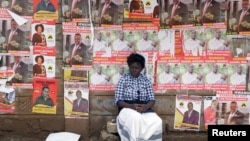With Kenya's general election five weeks away, Human Rights Watch says some communities in the Rift Valley region live in fear of attacks if they vote against the ruling Jubilee party, and some people have left after young men warned them to stay away from polling centers.
The rights organization is calling on authorities to investigate and prosecute those behind the threats and intimidation.
"We also had some direct threat of people telling their colleagues, 'Let us wait for August 8. We shall see where you will go. We shall be coming for you.' Those kinds of utterances," said Human Rights Watch researcher Otisieno Namwaya. "So people are afraid, people are leaving. Some of the families told us they were waiting for the schools to close and they will leave the area."
The rights agency's two-week investigation focuses on Naivasha in Nakuru Country, 90 kilometers from the capital, Nairobi. It was one of the areas hardest hit by violence after the 2007 election that was driven, in part, by ethnic divisions.
Kenya's electoral risk mapping shows 17 counties out of 47 have been identified as conflict-prone areas. Nakuru County is expected to experience election-related violence.
In June, the Interior Ministry opened a command center to respond to terrorism and election violence. Hundreds of officers from security agencies are training around the country to prevent violence tied to the election, with the goal of having a "credible, peaceful election" and stability in the weeks surrounding election day.
But Namwaya says police officers lack the ability to respond if violence erupts in August.
"We did not get the impression the police have done much," he said. "There were incidences where people were claiming that they have met with police, and there was no response, but we also found that the relationship between the police and the community is not so good."
Interior spokesperson Mwenda Njoka says security agencies are ready to stop electoral-related violence.
"We have mapped all the country," Njoka said. "We know we have about 22 areas that we identify as potential hotspots where we have done additional deployment of security officers from various groups, both the civil and the military, in case there is need for military intervention in some areas."
The head of the European Union Observer Mission, Maietje Schaake, told reporters that election violence is very possible.
"It's no secret that there are concerns about the possible outbreak of violence," Schaake said. "This is not inevitable. And it's clear that it will create a situation where everybody loses. There is responsibility for each and everybody to grant each other the right and safety to vote."
Kenya's election is August 8. President Uhuru Kenyatta hopes to win a second term against several challengers, including former Prime Minister Raila Odinga.




